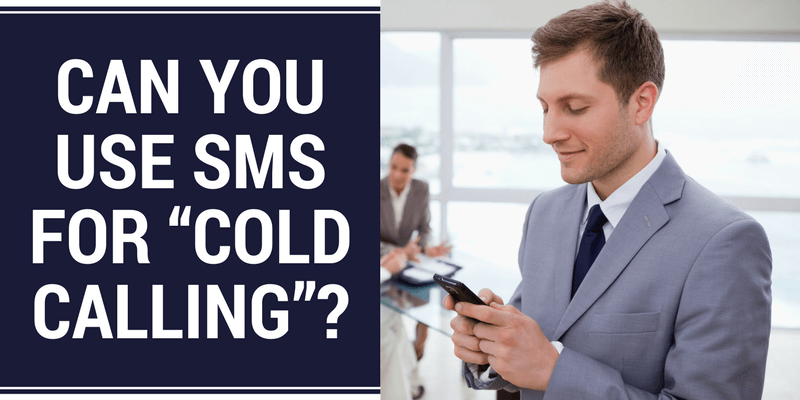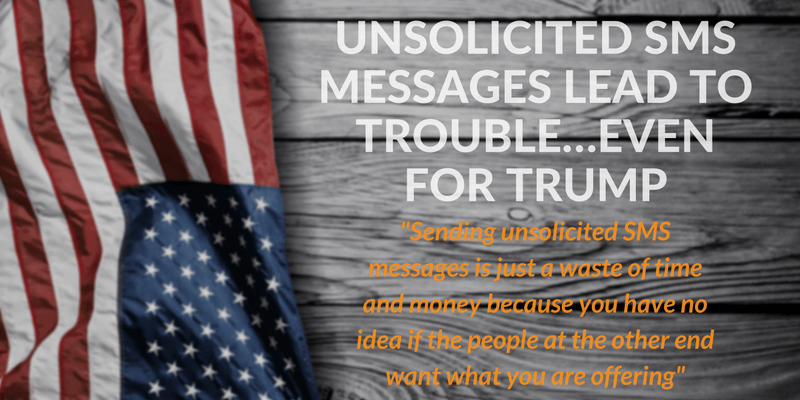Can You Use SMS for “Cold Calling”?

The thought of cold calling fills many sales people with dread. It also is the bane of many people’s existence because of excessive use by spammers who don’t respect the Telephone Preference Service. But it is a standard technique when trying to get new customers or clients.
Given the growth of mobile usage, though, is it ok to use SMS messaging for cold calling? The answer to that is: it depends.
Individuals
The regulations regarding SMS messaging to individuals are pretty clear. You can’t send any marketing messages to them unless they explicitly give you consent. This is a non-negotiable, absolutely clear, fact.
So, if you want to cold call (or is it cold text?) individuals using SMS, you can’t – at least not without violating regulations and potentially getting into trouble with the Information Commissioner’s Office (ICO).
Businesses
The same rules don’t apply to businesses, or “corporate subscribers”. The ICO says there’s only one requirement to contact a business and that is the sender must identify themselves and provide contact information.
This means you could use SMS much like you would a voice cold call. Why would you want to send businesses SMS messages, though? Here’s a use case I found recommended by a website for recruiters.
Many recruiters have corporate clients, and individual clients. That’s their job after all, to match job seekers to vacancies in companies. When a recruiter is trying to get new corporate clients, they often cold call them and offer their services.
These days, everyone is on a mobile. So, the theory I saw said that recruiters should expand to use SMS in their initial contacts with HR managers at their target companies. Mobile numbers are easy to find on company websites the article claimed. And if it’s on the website, then it’s you could contact them based on the ICO rules.
Should Versus Could
In the above scenario, a recruiter could use SMS to cold call a HR manager. If it went well, that recruiter might think he could use an SMS service to blast the same message to other companies he’s trying to get as clients. And he certainly could.
But should he?
SMS messaging is a great marketing tool. It can be used by larger corporations and the tiniest of businesses just the same. The costs are low, it’s convenient, and one of the best ways to get yourself directly in front of your customer (or future client in this example). Out of all the varied uses for it though, cold calling businesses may be one you don’t want to do – even though you can.
There are a few reasons for this. First, there’s one small caveat to the rules regarding marketing to businesses electronically. You can’t contact sole traders and some partnerships via SMS. These have the same protections as individuals. Sending them an SMS message without their consent would violate the regulations regarding direct marketing. This means that before sending any kind of mass marketing message out, you’d have to be positive that every business on the list is a corporate subscriber. That’s additional company research you may, or may not, want to do.
Second, you don’t know what the mobile number really is. Even if you find mobile numbers listed for businesses, you don’t necessarily know if it is a direct number. It could be a catch all virtual mobile number (VMN) for the entire corporation or department. Your message may never make it to your intended recipient because you won’t know how to address it to get through their system. There are companies that set up automatic routing of SMS messages based on keywords or department names. But you probably won’t know that by just looking at the number or website.
Maybe the message gets forwarded properly, maybe not. If it does, it may be sent to them as an email if the VMN interfaces with their corporate email system. If that’s the case, you might as well have just sent an email.
Third, the number might be their personal mobile (or one issued by the company). If it’s a true cold call message, it might appear as spam to them. So, while it’s a business number, it’s personal too, which enters a grey area. If they report the message as spam, you’ll have the burden of proving it was a business number. The ICO guidelines already make exceptions for personal work emails (emails issued by the company to an individual) in relation to marketing. Anyone using a work email has the right to request any marketing messages stop. While there is no specific direction on the use of SMS marketing to a personal work phone, if it ever became an issue I would imagine the same standard would apply.
SMS Messaging is Good for B2B
While I’m making the argument that SMS for cold calling businesses isn’t the best idea (at least not as a bulk marketing method), that doesn’t mean SMS for B2B isn’t good. In fact, it’s very good. According to B2Bmarketing.com, 80% of people use it for business. And 15% say the majority of their messages are for business.
It can be a great way to keep business clients up to date about offers, alerts, news, and special announcements. And even though an opt-in isn’t explicitly required, if you get it, you’ll know your messages are getting to the right person in a timely fashion because they would have specified their number during the process.
If you have any questions about using SMS messaging or marketing for business to business communications, we’d be happy to help. Just contact us on live chat, email or via phone and our friendly experts will answer your questions.
Related Articles
Small Businesses Can Succeed with SMS Marketing
Is SMS marketing a viable strategy for SMEs to grow their businesses? A recent article by a US SMS provider suggests not but we debunk that view. Read how and why Fastsms can help small businesses can succeed with SMS marketing without breaking the bank.
3 Important SMS Marketing Concepts You Need to Know
If you are looking to get going with SMS marketing it's worth learning a bit about the "tricks of the trade" so you avoid the common pitfalls and get off on the right foot. Read about three important marketing concepts that will maximise your success in this venture.
Can You Use SMS for “Cold Calling”?
Does the thought of cold calling fill you with dread? You might think it would be easier to use SMS messaging instead. And though it’s legal to do so in some circumstances, you might want to rethink using it that way. Read the full blog to find out why.
Why Finance Companies Should Excel at SMS Messaging
One of the most interesting use cases for SMS messaging is the financial industry. Just a couple weeks ago I wrote a blog on 7 ways the financial industry can use SMS messaging to communicate with customers. In this blog I'll expand on the topic from a different perspective: personalisation.
Unsolicited SMS Messages Lead to Trouble…Even for Trump
Late last month reports surfaced that the Trump US presidential campaign had sent unsolicited SMS messages to voters in the Chicago area. One man, Joshua Thorne, and his lawyers have filed a class-action lawsuit alleging the Trump Campaign violated the Telephone Consumer Protection Act (TCPA, the US equivalent of the PECR).
SMS Marketing – Should You Buy a List?
Starting an SMS marketing campaign can be a daunting task. Gathering explicit opt ins can take time, as you need to make an investment in advertising. So why not just get a jumpstart and buy a list of mobile numbers from an organisation that already has the opt ins? You could do that, but it’s probably harder than just getting people to opt in on their own. Here’s why.
SMS Marketing – A Brief Guide to the Data Protection Act 1998
Any UK business that collects, stores and uses other people’s personal data for purposes such as marketing and selling is subject to the rules of the Data Protection Act, and those using SMS marketing are no exception. Having a basic understanding of the DPA legislation and its main requirements is useful to maintain best practice in direct marketing such as SMS marketing and also helps to uphold your hard won customer trust - as well as avoid the potentially costly consequences of falling foul of the law. Read this article to learn how to avoid the simple pitfalls and get your SMS marketing campaign off to the right start.
Is SMS Marketing Complicated?
How hard is it to use SMS marketing? If you’ve been told it’s complicated, you heard wrong. Using SMS is simple, though there are a few things you should know. This blog shows you how simple it can be, and provides links to useful resources.











